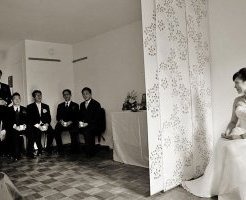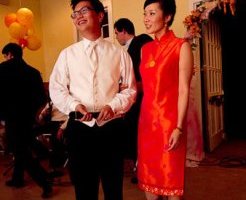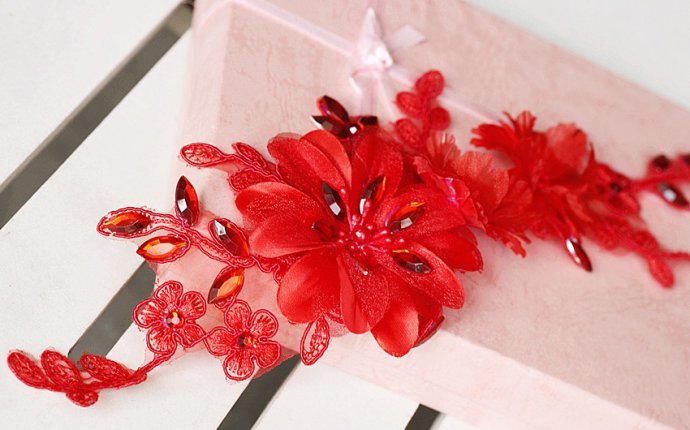
Chinese Wedding Hair Accessories
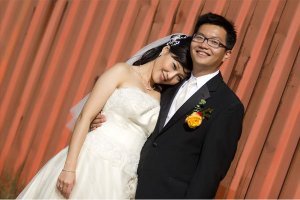 Hello, my lovely BG.com readers! With only six days left until our wedding, Luke and I are looking forward to breathing huge sighs of relief when the big day finally arrives (and also wondering how it passed by so fast!).
Hello, my lovely BG.com readers! With only six days left until our wedding, Luke and I are looking forward to breathing huge sighs of relief when the big day finally arrives (and also wondering how it passed by so fast!).
Here's something that will drag out that feeling just a bit longer: We're having another wedding. Well, not another wedding per se, but a reception in Singapore for my side of the family.
Although I am Eurasian and have a lot of non-Asian influences in my life, I grew up with a very strong Chinese background. So I wasn't surprised when my mum came up to me one day and asked if we could throw a reception back home for elderly family members who can't attend my Vegas wedding. In Asian culture, it is considered to be good luck to have all of your extended family present on a big occasion.
Check out more Chinese traditions that I plan to follow at my wedding!
1. Superstitious Slumber Party
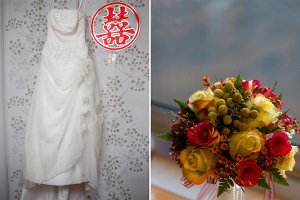 The night before the wedding, the bride returns home to her parents' house with her bridesmaids, while the groom heads off to his parents' home. The bride and groom (separately) wash their hair in water infused with pomegranate leaves, which are believed to ward off evil. Then they have their hair combed by a woman who is said to be "lucky"—she is chosen based on your personal opinion of what is considered to be fortunate (e.g. someone who has many children). She combs the couple's locks four times, and each stroke bears a special meaning: The first is so that the marriage will last forever, the second represents harmony in the union, the third is for fertility, and the fourth is for good health and fortune.
The night before the wedding, the bride returns home to her parents' house with her bridesmaids, while the groom heads off to his parents' home. The bride and groom (separately) wash their hair in water infused with pomegranate leaves, which are believed to ward off evil. Then they have their hair combed by a woman who is said to be "lucky"—she is chosen based on your personal opinion of what is considered to be fortunate (e.g. someone who has many children). She combs the couple's locks four times, and each stroke bears a special meaning: The first is so that the marriage will last forever, the second represents harmony in the union, the third is for fertility, and the fourth is for good health and fortune.
2. Four Points for Your Mother-in-Law
The following morning, the bridesmaids arrive (if they didn't stay over the night before), and they all get their hair and makeup done together. Sounds normal so far, right? During this time, the bride is given four "points" of gold, which consist of a necklace, pendant, bangle, and earrings. The mother of the groom usually gifts the jewelry to welcome her new daughter. Back in the day, only yellow gold was allowed, but these days, white gold or silver is permitted also.
3. Orange You Fortunate
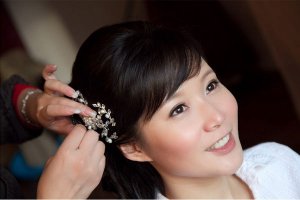 Before the wedding, family elders—who sought religious or non-religious counsel—determine an auspicious time for the groom to come to the house and "collect" his bride. He usually brings an entourage of boys and waits for the younger brother (or cousin) of the bride to open his car door before exiting. Once this relative opens the door, he hands mandarin oranges to the groom in exchange for a red, traditional envelope used during special occasions, like Chinese New Year. The oranges stay in the car for good luck.
Before the wedding, family elders—who sought religious or non-religious counsel—determine an auspicious time for the groom to come to the house and "collect" his bride. He usually brings an entourage of boys and waits for the younger brother (or cousin) of the bride to open his car door before exiting. Once this relative opens the door, he hands mandarin oranges to the groom in exchange for a red, traditional envelope used during special occasions, like Chinese New Year. The oranges stay in the car for good luck.
4. The Groom Challenge
So why does the groom need all of his male pals and relatives present? Because his entry into the house is met with a series of challenges by the bridesmaids! While the bride waits with her parents in anticipation for her groom, the ladies-in-waiting are outside, armed with tests and games for the groom. This tradition is symbolic of the bride's family's love and their unwillingness for their daughter to leave the family. Nowadays, it’s more of a chance for the girls to see how far the groom will go for his bride. We’re talking anything from having to eat wasabi at 10 a.m. to doing handstands with all of his groomsmen!
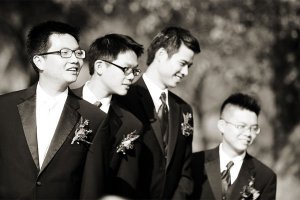 This usually ends with the girls bartering for an “entrance fee” of sorts. The denomination has to be an even number. Once the groom is granted permission into the house, he gets to see his bride, lift her veil, and kiss her! Sounds familiar, no?
This usually ends with the girls bartering for an “entrance fee” of sorts. The denomination has to be an even number. Once the groom is granted permission into the house, he gets to see his bride, lift her veil, and kiss her! Sounds familiar, no?
5. Tea Ceremonies
Once the groom passes his wedding test, he and the bride serve tea to her family to give them thanks. Once again, the tea must be made by a very lucky lady, much like the one who combed their hair the night before. Then they head off to the groom's family, where the bride must change into a traditional Chinese wedding outfit to serve tea to the groom's family. The tea must be made with longans (aka "dragon eyes") and dates to symbolize fertility and male offspring (the Chinese still have strong beliefs about the importance of bearing male children to keep the family going).
When the couple serves tea to his family—which has now become her own—they are given red envelopes with money and sometimes even gold jewelry, which the bride must put on immediately.
All photos courtesy of Casey Fatchett Photography
Tell us: What cultural traditions are you including in your wedding?
—Theresa Misso
P.S. These traditions are just the tip of the iceberg. The Chinese have different dialects and they bring different traditions to their weddings, too! The ones I mentioned were passed down to me from my mum.
